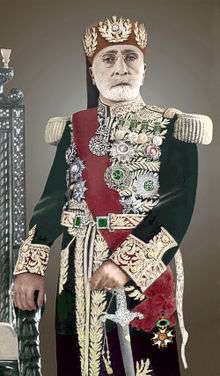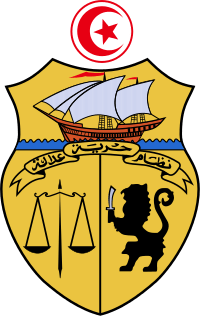Kingdom of Tunisia
The Kingdom of Tunisia (French: Royaume de Tunisie; Arabic: المملكة التونسية el-Mamlka et-Tūnsīya) was a short-lived kingdom established on 20 March 1956 after the Tunisian independence and lasted until the declaration of the republic on 25 July 1957.
Kingdom of Tunisia Royaume de Tunisie المملكة التونسية | |||||||||
|---|---|---|---|---|---|---|---|---|---|
| 1956–1957 | |||||||||
Anthem: Salam al-Bey | |||||||||
| Capital | Tunis | ||||||||
| Common languages | Tunisian Arabic, French | ||||||||
| Religion | Islam | ||||||||
| Government | Constitutional monarchy | ||||||||
| King | |||||||||
• 1956–1957 | Muhammad VIII al-Amin | ||||||||
| History | |||||||||
| March 20 1956 | |||||||||
| July 25 1957 | |||||||||
| Currency | Tunisian franc | ||||||||
| ISO 3166 code | TN | ||||||||
| |||||||||
Independence

Part of a series on the |
||||||||||||||
|---|---|---|---|---|---|---|---|---|---|---|---|---|---|---|
| History of Tunisia | ||||||||||||||
 | ||||||||||||||
|
Prehistoric |
||||||||||||||
|
Ancient
|
||||||||||||||
|
|
||||||||||||||
|
||||||||||||||
|
| ||||||||||||||
An independence movement lasting many decades eventually prevailed, leading to the end of the French protectorate (commenced in 1881). In 1954 the Tunisian struggle and consequent civil disturbances resulted in the start of negotiations for autonomy between France and the Neo Destour political party (essentially under Habib Bourguiba) supported by the Tunisian labor unions and by the Arab League. The agreed Convention of April, 1955, stated that France would retain control of the army and foreign affairs while granting autonomy, which was to begin the following year. Bourguiba was released from prison by the French to a tumultuous welcome. This compromise, however, split the Neo Destour; eventually it led to suppression of its left wing, and expulsion of its radical, pan-Arab leader Salah ben Youssef (or Yusuf), who later fled to Egypt. This resolution of intra-party strife signalled that Neo Destour would pursue a moderate path. The French then terminated their protectorate over Morocco, in order to concentrate their forces in Algeria. In reaction, and following the strong public opinion voiced by Tunisians, Bourguiba pressed for independence. The French, overcoming the heated objections of the French settlers, eventually acceded and protocols were drafted. On 20 March 1956, Tunisia achieved its full sovereignty. In July Tunisia's application for membership in the United Nations was accepted.
The French conceived an independent Tunisia as a constitutional monarchy ruled by the Bey of Tunis, Muhammad VIII al-Amin Bey (Lamine or Amin Bey). The Bey was an institution that dated back to the early Ottoman era. The prior Bey Muhammad VII al-Munsif (Moncef Bey) had been a popular nationalist, but Amin Bey was both considered by some to be compromised by the French, by others to be a youssefist. Already scheduled elections were held on 25 March 1956; due to secret arrangements negotiated by Bourguiba with the Bey the voters choose only party lists, not candidates. This arrangement made it easier for the Neo Destour party to keep out any youssefist or other dissidents, and to maintain party discipline.[1] The elections were then swept by the Neo Destour party, whose leader Habib Bourguiba (Habib Abu Ruqaiba) became prime minister. On 25 July 1957, the monarchy was abolished, the beylical office terminated, and Tunisia proclaimed a Republic. The assembly then made Bourguiba the first president, of what would be a single-party state.[2][3][4][5][6]
References
- Cf., Geyer, Tunisia (London: Stacy 2003) at 41. Geyer notes the "pyramidal structure" of the Neo Destour, nonetheless she praises Bourguiba's "flexibility and moderation".
- Kenneth J. Perkins, A History of Modern Tunisia (Cambridge University 2004) at 125-129, 131-133.
- Lisa Anderson, The State and Social Transformation in Tunisia and Libya, 1830-1980 (Princeton University 1986) at 231-235.
- Ivan Hrbek, "North Africa and the Horn" 127-160, at 129-132, [under section "The struggle for political sovereignty: from 1945 to independence"], in Ali A. Mazrui, editor, General History of Africa. VIII Africa since 1935 (UNESCO 1993).
- Jane Soames Nickerson, A Short History of North Africa (New York: Devin-Adair 1961) at 162-165.
- Richard M. Brace, Morocco Algeria Tunisia (Prentice-Hall 1964) at 114-116, 121-123.
.svg.png)